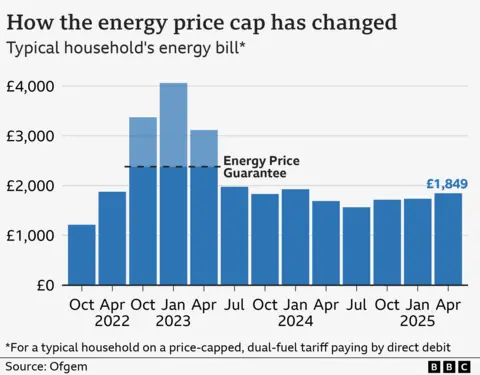People should consider energy bill fix, regulator says
 Getty Images
Getty ImagesHouseholds are being encouraged to consider a fixed price deal on their energy bills by the regulator ahead of costs rising again in April.
Ofgem is increasing the energy price cap by 6.4%, meaning a household using a typical amount of gas and electricity will see their bill rise by £111 a year, or £9.25 a month, to £1,849.
The cap, which is set every three months and limits the amount suppliers can charge for each unit of energy, affects 22 million homes in England, Wales and Scotland.
Ofgem said switching to a fixed tariff provided certainty over payments and could reduce costs, although analysts predict prices could fall in July.
The rise in April will hit people's finances at the same time as water and council tax increases, although average wages are also going up.
The regulator said rising wholesale costs and inflation were behind the latest energy price hike - the third consecutive increase in the quarterly cap and more than the 5% analysts had forecast.
While the cost of each unit of gas and electricity is capped, the total bill is not, so bills will vary depending on how much energy is used.
Ofgem illustrates the cap by showing the impact on the annual bill of a household with typical energy usage.

Standing charges - fixed fees to connect to a gas and electricity supply and vary by region - are rising again for gas but dropping for electricity. Some customers in London and the North Wales and Mersey region will see an overall increase of up to £20 a year.
Ofgem's chief executive Jonathan Brearley accepted another increase in energy costs was "unwelcome".
He said customers, where possible, should consider "switching or fixing tariffs now" to try to lower costs and "provide certainty over coming payments".
According to Ofgem, about four million households have fixed in recent months.
Some people in debt to their supplier will not be able to switch firms, but should still be able to fix with their current provider on their best fixed deal.
Anyone worried about paying their bills should contact their supplier for help, Mr Brearley added.
Martin Lewis, founder of Money Saving Expert, told the BBC that moving to a fixed deal was a "no-brainer".
He said people should check whole-of-market comparison sites for the best deal, and wait a little while before choosing a new tariff as he has heard some "good tariffs are being launched" by energy firms.
However, analysts at consultancy Cornwall Insight have forecast variable prices could fall again in July to close to the current level.

At a mum and baby sensory class in Manchester, parents said rising bills were a constant worry.
"We have definitely felt a difference in the quality of life we can afford now," said Michelle Gill, who attended the session with her baby, Ori.
"Things we didn't think about a year ago are now at the front of our mind."
Melissa Rawling, mum of baby Ezra, said that because they have a baby, "we have to keep the heating on more but it's not what we would like to be doing".
"I'm more conscious of being out during the day so we don't have to keep the heating on. We can't spend all day at the park when it's cold so things like this class are ideal for keeping warm."
Debt fears
Charities said the price increase would be a painful blow for billpayers.
Citizens Advice said its research suggested 6.7 million people in England, Wales and Scotland were in debt to their energy supplier. Official figures show nearly £4bn is owed.
"We're helping people every day who simply can't afford this latest price hike," said its chief executive, Dame Clare Moriarty.
The government has announced it is planning to extend the number of people who qualify for the Warm Home Discount scheme next winter - which gives some people on benefits a reduction of £150 from their annual energy bill.
Energy bills are about 50% higher than pre-Covid levels, but remain below the peak reached in 2022 when Russia's invasion of Ukraine caused prices to spike.
Ofgem director general of markets, Tim Jarvis, said the latest price rises were driven by international gas prices, which have gone up "significantly" recently.
However, analysts at Cornwall Insight said energy prices have dipped in the past couple of weeks following US-Russia talks on a potential end to the Ukraine war.
As a result, the consultancy has forecast the price cap in July will fall to £1,756 a year for a typical consumer, although it noted this would still be hundreds of pounds above the pre-conflict level.
It also said volatility in the energy market means it is likely the price cap predictions "will change multiple times" before July.
The latest changes mean that in April:
- Gas prices will be capped at an average of 6.99p per kilowatt hour (kWh), and electricity at 27.03p per kWh - up from 6.34p and 24.86p respectively. A typical household uses 2,700 kWh of electricity a year, and 11,500 kWh of gas
- Households on pre-payment meters are paying slightly less than those on direct debit, with a typical annual bill of £1,803
- Those who pay their bills by cash or cheque are paying more, with a typical annual bill of £1,969
- Standing charges have dropped to 53.8p a day for electricity but risen to 32.67p a day for gas, compared with 60.97p and 31.65p respectively, although they vary by region
The regulator has extended the Debt Allowance Scheme – a charge for all customers to cover the cost of that debt support - until something different is done to deal with the amount of debt being accrued.
In response to the latest price increase, Energy Secretary Ed Miliband said the government was determined to protect people, by extending the Warm Home Discount and encouraging energy creation in the UK.
Acting shadow energy secretary Andrew Bowie said the price rise was "a betrayal to the families who Ed Miliband promised to save £300 on their bills".
Liberal Democrat leader Ed Davey repeated his demand for a reversal to cuts to the number of pensioners eligible for the Winter Fuel Payment.

How to keep energy use - and bills - down
Experts have shared three tips to keep on top of energy use during the warmer months:
- If your hot water is too hot to wash your hands in, then your setting is too high so turn the boiler down
- Manage your draughts, such as putting a black bag with scrunched up paper up an unused chimney, or limit other draughts around the home
- Limit time in the shower to four minutes. The charity WaterAid has compiled a playlist of four-minute songs to keep you to time

Sign up for our Politics Essential newsletter to read top political analysis, gain insight from across the UK and stay up to speed with the big moments. It'll be delivered straight to your inbox every weekday.
